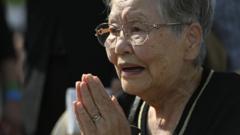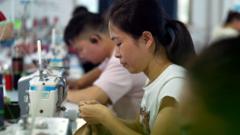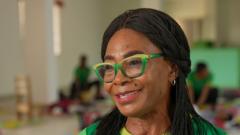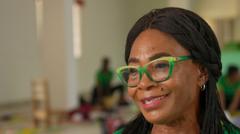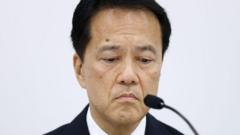In this poignant article, we uncover the tragic aftermath faced by Korean survivors of the Hiroshima bombing, many of whom live in an area known as "Korea's Hiroshima." These individuals carry not only the physical scars of disfigurement and illness caused by the bomb but also the emotional burden of being neglected and unrecognized by their own country, Japan, and the United States. Their fight for justice continues as they seek acknowledgment and support for the generations affected by this catastrophe.
Forgotten Survivors: The Untold Story of Korean Atomic Bomb Victims

Forgotten Survivors: The Untold Story of Korean Atomic Bomb Victims
Survivors of Hiroshima's atomic bomb share their harrowing experiences and ongoing struggles in South Korea.
```
At 08:15 on August 6, 1945, as a nuclear bomb plummeted toward Hiroshima, 88-year-old Lee Jung-soon was en route to her elementary school in Korea. Struggling to repress the memories, she recalls her father's urgent warning to evacuate, as chaos engulfed the streets. Survivors like Lee witnessed unimaginable horrors; bodies boiled and disfigured from the explosion, as 'Little Boy' devastated the city, instantly killing approximately 70,000 people, with even more succumbing to radiation exposure in the following months.
Eight decades later, the tragic history of the bombing is often overlooked, particularly the plight of the 20% of victims who were Koreans. At the time, around 140,000 Koreans resided in Hiroshima, ensnared by colonial exploitation. The survivors and their offspring continue to grapple with severe health issues and a lack of justice, seeking recognition in a society that has largely forgotten their sacrifice.
Survivors like 83-year-old Shim Jin-tae express their anguish over the lack of accountability: neither the bombers, the Japanese government, nor even their own Korean leadership have taken responsibility. Living in Hapcheon, South Korea—a community home to many survivors—their experiences remain shrouded in stigma, neglect, and discrimination. Lee suffers from multiple health issues that she attributes to her exposure, while her son Ho-chang faces his own battles with kidney failure.
As survivors recount their harrowing experiences of being ostracized by their communities, particularly those returning home after the war, they reveal a cycle of prejudice and hardship. Stigmatized as 'cursed', some survivors faced discrimination even from their families, with their children suffering similarly.
A push for recognition is gaining momentum. Studies indicate that second-generation survivors endure elevated health risks, yet governmental acknowledgment remains elusive, with requests for proof continually dismissed. The Ministry of Health in Korea has begun collecting genetic data but only promises expanded recognition if supported by significant findings.
Recent visits from Japanese officials mark notable attempts to reconcile, yet many survivors and activists argue that genuine apologies remain outstanding—without acknowledgment of historical grievances, healing remains unlikely. For those affected, the fight for recognition and justice is not merely about compensation but about ensuring their stories are remembered and learning from the past. As Shim emphasizes, “Memory matters more than compensation.” Their voices must not fade, lest the horrors of Hiroshima repeat themselves.
```
At 08:15 on August 6, 1945, as a nuclear bomb plummeted toward Hiroshima, 88-year-old Lee Jung-soon was en route to her elementary school in Korea. Struggling to repress the memories, she recalls her father's urgent warning to evacuate, as chaos engulfed the streets. Survivors like Lee witnessed unimaginable horrors; bodies boiled and disfigured from the explosion, as 'Little Boy' devastated the city, instantly killing approximately 70,000 people, with even more succumbing to radiation exposure in the following months.
Eight decades later, the tragic history of the bombing is often overlooked, particularly the plight of the 20% of victims who were Koreans. At the time, around 140,000 Koreans resided in Hiroshima, ensnared by colonial exploitation. The survivors and their offspring continue to grapple with severe health issues and a lack of justice, seeking recognition in a society that has largely forgotten their sacrifice.
Survivors like 83-year-old Shim Jin-tae express their anguish over the lack of accountability: neither the bombers, the Japanese government, nor even their own Korean leadership have taken responsibility. Living in Hapcheon, South Korea—a community home to many survivors—their experiences remain shrouded in stigma, neglect, and discrimination. Lee suffers from multiple health issues that she attributes to her exposure, while her son Ho-chang faces his own battles with kidney failure.
As survivors recount their harrowing experiences of being ostracized by their communities, particularly those returning home after the war, they reveal a cycle of prejudice and hardship. Stigmatized as 'cursed', some survivors faced discrimination even from their families, with their children suffering similarly.
A push for recognition is gaining momentum. Studies indicate that second-generation survivors endure elevated health risks, yet governmental acknowledgment remains elusive, with requests for proof continually dismissed. The Ministry of Health in Korea has begun collecting genetic data but only promises expanded recognition if supported by significant findings.
Recent visits from Japanese officials mark notable attempts to reconcile, yet many survivors and activists argue that genuine apologies remain outstanding—without acknowledgment of historical grievances, healing remains unlikely. For those affected, the fight for recognition and justice is not merely about compensation but about ensuring their stories are remembered and learning from the past. As Shim emphasizes, “Memory matters more than compensation.” Their voices must not fade, lest the horrors of Hiroshima repeat themselves.
```

